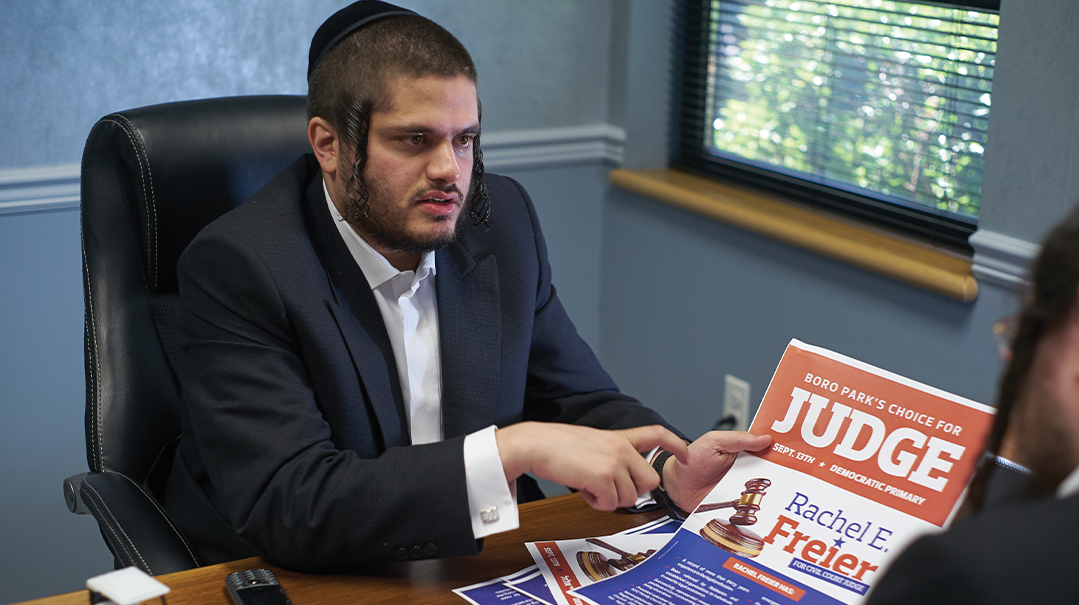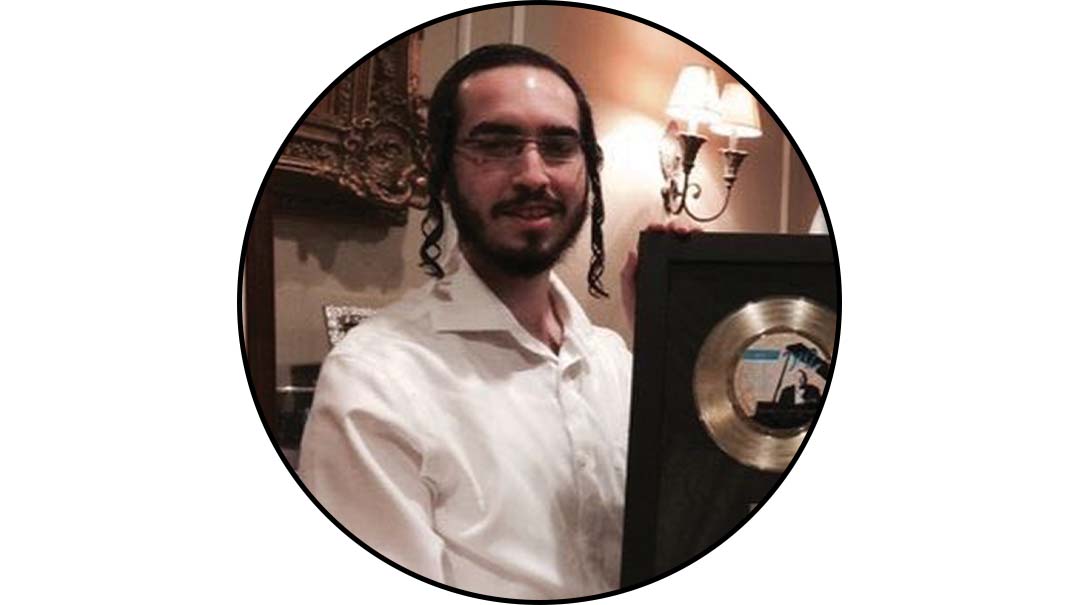Namedrop: Rabbi Dovid Bashevkin


NAME: Rabbi Dovid Bashevkin
POSITION: Director of Education NCSY
MOTTO: Try to balance sensitivities and sensibilities
ROLE MODEL: My parents Dr. Michael and Joy Bashevkin
R
abbi Dovid Bashevkin has no address on his front door.
He welcomes me to his Teaneck home with a wide smile. “I wanted to see what a lamdan you were” he says in yeshivish sing-song “to see how long it would take you to find me without the address!”
We planned go out for coffee, but my wants to quickly show me the bookcase in his basement. It will only take a moment, he says, then we’ll go. But the titles and ideas raining down from the simple wooden shelves form a little pile of intellectual quicksand holding me captive. The coffee never happens.
It’s clear that for all his yeshivishe banter and easy affability, Dovid Bashevkin moves effortlessly between several worlds. He’s a talmid of Rav Tzvi Berkowitz of Ner Israel Baltimore and, he’s written a lomdishe sefer called B’Rogez Rachem Tizkor. He has a master’s degree in Polish chassidus from Yeshiva University and is pursuing his doctorate in Public Policy and Management at the New School’s Milano School of International Affairs Management and Urban Policy.
It’s hard to imagine this free spirit working through an organization, but his day job — director of education for NCSY — confines him to a desk at the Orthodox Union’s Manhattan headquarters.
“Here let's go back upstairs” he says his face lighting up at the observation. “One of the most popular shiurim we give is called Apple and Coca Cola; a closer looks at two companies that shaped America. One is all about tradition — Coke almost lost everything when they tried to change — while the second sells constant innovation and upgrade. It’s the difference between Kohanim and geirim both necessary for Klal Yisrael to exist.” He’s getting into it and I hold up my hand to stop him.
“What does that have to do with your job?”
“Aha.” He pours two cups of Snapple. “Because it’s the biggest struggle we face today as a community. We have these glorious tradition-rich institutions organizations communities, and at the same time we have young people who speak a different language. We need to reach them.”
He is earnest as he heads back to the comfortable basement where he pulls a book off the shelf. “This is about the battle for ratings in late-night television but it matters. It details the argument between studio executives who believed that the show in question was a brand America loved, and to tamper with the time slot, or any other feature, would ruin everything. Others saw the changing landscape and made changes to meet the demand. The lessons are relevant. Very relevant.”
Bashevkin, the son of well-known oncologist Dr. Michael Bashevkin, grew up on Long Island and, somewhere along the way, he got a glimpse of the richness of Jewish thought. “Ari Bergmann gave shiurim on the seforim of Rav Tzadok HaKohein at Shaaray Tefila in Lawrence and they changed my life. Later, when I learned at Sha’alvim, Rabbi Ari Waxman introduced me to the Torah of Rav Hutner. I felt like I was seeing things in color for the first time.”
Today Bashevkin is happiest when he can take these esoteric ideas and present them to the teenagers of America Jewish neshamos exposed to little by way of Jewish thought. “It’s a challenge — to let them feel that thrill and excitement what happens deep inside a person when they actually taste Yiddishkeit!”
A typical assignment involves breaking down heavy ma’amarim from classic seforim into user-friendly accessible ideas — and it’s here that his upstairs seforim shrank meets his downstairs bookshelf. He’s a master at creating appealing titles for derashos; he’s actually presented a lecture on the topic at an AJOP convention. “It isn’t marketing — it’s finding the enduring relevance in each idea.”
The 30-year-old got married two years ago, and he took advantage of his relative freedom during those interim years to travel serving as scholar in residence at shuls across the country. “The main thing I learned is that rabbis don’t invite guest lecturers to their communities simply to enrich the congregants” he deadpans. “They do it because they need company. Even a rabbi needs a good schmooze with someone who understands him once in a while.” He laughs heartily at his own joke.
Bashevkin is funny. Really funny. He’s on the editorial board of the OU’s Jewish Action magazine, and his writings appear in various online forums. He has that rare ability to blend gentle mockery and intensity, Kotzker self-awareness with spiritual yearning.
His parody of the Pew Report entitled the Phew Report presents its own list of contemporary challenges:
As part of the study, the Phew report ranked the top ten issues facing Orthodox Jewry. Below are the responses ranked in order of what respondents thought most important to least important.
1. Tuition
2. Children shouldn’t marry someone you know “too Modern.”
3. Israel
4. Do those Kupat Ha’Ir brachos work? Seems enticing.
5. Children shouldn’t marry someone you know “too yeshivish.”
6. Is Starbucks kosher?
7. I heard someone is starting a new Succos program. Does it have a website?
8. Accessibility to sushi
9. Affordable Pesach programs
10. Is Inwood really one of the Five Towns?? Are you sure? Shouldn’t the fifth be West Hempstead?
In another piece, the student of Polish chassidus quotes its key figure. Introducing his own bio blurb Bashevkin admits:
I find bio blurbs very eerie, like looking at a photoshopped family photo. Vague phrases like “sought-after speaker” and “internationally renowned” that would seem narcissistic if spoken are strangely accepted practice in bio blurb writing etiquette.
The Kotzker said “I like to keep my good deeds private and failures public.” Of course we should be proud of our successes but both for a more honest reflection of life and as a sign of encouragement and solidarity…. perhaps we can do a better job of integrating life’s failures within our typically self-obsessed bio blurbs. It’s great to list all of your successes in three to five short sentences but maybe if one of those sentences was a failed project rejected application or unexpected difficulty even our successes would seem more lively…. It’s only one sentence to tell others that life will always have its disappointments.…
In fact I’ll start with mine.
David Bashevkin is the Director of Education for National NCSY and is pursuing a doctorate in Public Policy and Management at The New School’s Milano School of International Affairs. He was rejected from the Wexner Graduate Fellowship. Twice.
The piece is in a sense Dovid Bashevkin’s real bio: cheeky but profound.
There are thousands of teenagers whose Jewish experience consists of bar mitzvah lessons maybe a trip to Israel. They know it’s genuine; it just doesn’t speak to them.
Rabbi Dovid Bashevkin is finding a way to make authentic accessible. He’s preparing Coke with a touch of Apple.
Oops! We could not locate your form.



